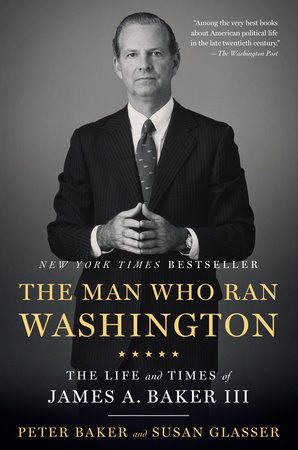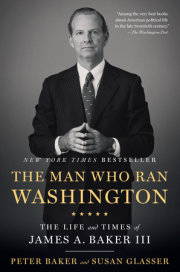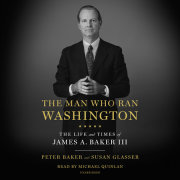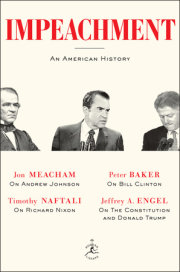Prologue
The Velvet Hammer
A little more than a week before the 2016 presidential election, Jim Baker was obsessing over what to do about Donald Trump. Baker’s wife, daughters, and closest advisers were urging Baker to vote against him. Baker’s best friend, former president George H. W. Bush, his partner for nearly a half century on the tennis courts, on the campaign trail, and on the world stage, had made it clear that he would vote against Trump. So had Bush’s son, former president George W. Bush, and other members of the Bush family.
Throughout the long, nasty campaign, Trump had been attacking the Bushes and pretty much everything they—and Baker—stood for. Trump had asked for an endorsement and Baker had refused, but he still was not sure what to do in the privacy of the voting booth. He saw the modern Republican Party as a global bulwark of open markets, free enterprise, and the American way of life. He had helped to build it and he was used to winning. Now Trump, vain and bombastic, a flashy New York real estate mogul who boasted of grabbing women’s private parts and seemed like a sure loser, threatened to upend all that. But Trump was the party’s nominee, and Baker, late in life, remained a party man.
We sat down with Baker in his favorite suite at the Willard Hotel, the ornate Victorian landmark barely a block away from the White House. Baker was eighty-six years old at the time, although you would not have known it. He wore his customary dark suit with money-green tie, a habit he picked up when he became secretary of the treasury in Ronald Reagan’s second term and had continued ever since. A courtly lawyer with a Texas twang, a perpetual twinkle in his eye, and an ear for gossip, Baker dominated both American politics and policymaking through much of the 1970s, 1980s, and early 1990s with a mastery rarely seen before or since. But for the last several years, over the course of dozens of hours of interviews, it had become clear that Baker thought the country had gone seriously off course. “The point of holding power is to get things done and accomplish things,” he told us once in the summer of 2014, his voice rising almost an octave in exasperation. He pressed that point whenever the current generation called for advice, which they still did fairly often, but he seemed mystified that the message was not getting through. “The argument I’ve been making,” he said, “is that we’re not
leading.”
Now, on that Halloween morning in 2016, Trump seemed like a catastrophic herald of the system’s breakdown. “The guy is nuts,” Baker sighed as we talked in the sunny oval sitting room of his suite. “He’s crazy. I will not endorse him. I’ve said that publicly. I’ve told him that.” Trump was promising a destructive end to the Washington-led world order that Baker and others had spent a generation designing. He disparaged long-standing alliances, vowed to rip up free trade pacts, decried American leadership outside its borders, casually embraced a new nuclear arms race, and sought to reverse the globalization that had defined international politics and economics since the end of World War II. He opposed just about everything that Baker and the modern Republican Party supported and Baker ticked them off for us again that morning: “He’s against free trade. He’s talking about NATO being a failed alliance. He’s dumping all over NAFTA,” the trade pact with Mexico and Canada that Baker had helped set in motion. Baker still backed it, as did the vast bulk of his party. “That was a hell of a deal,” he said, shaking his head. Yet in Trump’s view, the leaders of the past—Baker and his contemporaries—had bungled their chance and squandered American greatness. Trump’s campaign, as quixotic as it originally seemed, had tapped into a powerful strain of resentment with his pledge to blow up Washington and remake it in his own image. He promised to drain the very swamp on which the Willard stood.
Voting against Trump should have been an easy call for Baker. Trump, after all, was “a guy who’s his own worst enemy,” as Baker reminded us. “He can’t keep his mouth shut.” But Baker also was not quite ready to walk away from the party to which he had devoted so many years. He knew what it felt like when political power shifted and he knew that it was much better to be on the winning side. He had fought against the Reagan Revolution inside the Republican Party on behalf of Gerald Ford and George Bush, then became the revolution’s most capable executor as Reagan’s White House chief of staff. As Bush’s secretary of state, he had watched the unraveling of the Soviet Union and its empire in Eastern Europe, another revolution that Baker did not start but figured out how to channel. The lesson he had taken from these events was simple and it was clear: When the tectonic plates of history move, move with them.
When it came to Trump and the nationalist-populist backlash that he represented, however, Baker just could not decide. It was only days before the election, and he went back and forth. At the end of our long conversation, after touching on Middle East peacemaking and the inner machinations of the Bush White House and the bipartisan prayer group he used to attend on Capitol Hill, we circled back to the subject at hand.
Could Jim Baker, the very definition of the establishment, really vote for Donald Trump?
Baker looked stricken. “Well,” he said, “I haven’t voted for him
yet.”
Delegate hunter, campaign manager, White House chief of staff, treasury secretary, and secretary of state, James Addison Baker III played a leading role in some of the most critical junctures in modern American history. For a quarter century, every Republican president relied on Baker to manage his campaign, his White House, his world. Baker brought them to power or helped them stay there, then steered them through the momentous events that followed. He was Washington’s indispensable man.
Any chronicle of the modern presidency would find Baker at the heart of virtually every chapter, for his was an unmatched case study in the acquisition, exercise, and preservation of power in late-twentieth-century America and into the first decade of the twenty-first. He was the campaign operative who secured the Republican nomination for Gerald Ford against a relentless challenge from the right by Ronald Reagan in 1976, then four years later managed George Bush’s first presidential campaign, which proved successful enough to earn Bush the vice presidency and Baker a spot by the new president’s side. He set up and ran Reagan’s White House as chief of staff for four years, securing many of the achievements that shaped the legacy of the fortieth president. In Reagan’s second term, with nothing more than an undergraduate course in economics, he took over as secretary of the treasury and rewrote the American tax code from top to bottom in collaboration with leading Democrats. He returned to the campaign trail in 1988 to win the presidency for Bush in a harshly negative election that foreshadowed some of the political nastiness of races to come, then switched back into statesman mode as America’s top diplomat, from which perch he effectively managed the most tumultuous period in international politics since World War II.
Over the following few years, as Washington presided over the of the Cold War, Baker shaped a new American approach to a reordered world. Through it all, he was the archetype of a style of American politics and governance that today seems lost, an approach focused on compromise over confrontation, deal-making over disagreement and pragmatism over purity. He negotiated with Democrats at home and Soviets abroad, assembled the coalition that won the Gulf War and brokered the reunification of Germany in the heart of Europe. He was the “gold standard” among White House chiefs of staff, as virtually everyone put it, and went on to become the most consequential secretary of state since Henry Kissinger. In short, he was the un-Trump.
We had set out to write a biography about Baker during Barack Obama’s presidency, when the nation was already starkly divided but Trump’s ascendance was still unthinkable. As we interviewed Baker and his contemporaries for the book, the increasingly real prospect of a President Trump suggested an even more urgent reason for the project than we had originally envisioned: the unraveling of the political system that Baker had learned to operate so skillfully, at just the moment when the post–Cold War international order that he and his generation had established was fraying. At least to start, a book about Baker had seemed like escapism, offering an opportunity to time-travel back to Washington at the tail end of the Cold War, as the fractious 1980s evolved into a 1990s when America, suddenly, reigned supreme. That was Baker’s moment. Freedom, and McDonald’s, had come to Red Square; apartheid had ended peacefully in South Africa. History was not over, but it was definitely happening, right there for everyone to see on twenty-four-hour cable news. Although that did not erase the partisan conflicts and bitter discord roiling American politics through the Reagan years, and the city had its usual supply of hypocrites and charlatans, demagogues and dilettantes, it was a far more optimistic Washington than today’s angry, anxious capital, a Washington where getting things done was not just possible but required.
Baker seemed to us the representative of that time; certainly, he was the uniquely successful exemplar of it, a hard-edged partisan who nonetheless believed in bipartisanship and thought elections required a record to run on, not merely a provocative position to tweet. But if Baker’s Washington was a more functional, fundamentally more civil place, it was still a capital whose currency was power, populated by political animals for whom access, influence, and image were paramount. Baker was one of them. He was calculating and canny and opportunistic in all the ways that reflected the city whose top jobs he had conquered, one by one. He did not question its injustices, or the insularity of a world populated by white men who looked and sounded like him. Then again, neither did he come to Washington to fight the culture war that animated so many of his fellow Republicans. As our conversation on the eve of Trump’s election suggested, Baker had not become the ultimate Washington player because of his ideological fervor, but because, better than anyone of his generation, he figured out how to wield the levers of power. His doctrine was deal-making. Real deals, ones that stuck, deals that changed the world. And you cannot make deals and get things done while criticizing from the outside. Baker knew that. You have to be on the inside. You have to be allowed to play the game before you can win it.
Copyright © 2020 by Peter Baker and Susan Glasser. All rights reserved. No part of this excerpt may be reproduced or reprinted without permission in writing from the publisher.











